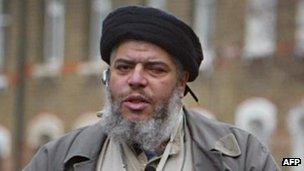Abu Hamza's health has deteriorated, High Court hears
- Published

Lawyers for Abu Hamza argue that his health has deteriorated
Terror suspect Abu Hamza al-Masri's health has worsened and he should not be extradited to the US before a scan, his lawyer has told the High Court.
Abu Hamza is among five men asking judges to grant an injunction against their extradition from the UK.
Abu Hamza says handing him over would be "oppressive". Fellow suspect Khaled al-Fawwaz, meanwhile, says new evidence discredits the case against him.
The UK government said the last-ditch case was an abuse of the legal process.
It has said it wants to deport the suspects "as quickly as possible".
'Harsh environment'
The men are among six terror suspects held in the UK who are wanted in the US.
The application for injunctions came after the European Court of Human Rights backed successive UK courts in ruling that the men could be sent to the US to face charges.
To avoid extradition, Abu Hamza, Mr al-Fawwaz, Syed Ahsan, Babar Ahmad and Adel Abdul Bary must convince the High Court that there are "new and compelling" reasons for their cases not now to proceed.
Abu Hamza's lawyer Alun Jones QC said the "uncontradicted medical opinion" was that an MRI scan was "medically necessary".
He asked the court for a temporary injunction blocking Abu Hamza's removal until tests has been competed as he may be unfit to stand trial.
Mr Jones said a judge referred to Abu Hamza's "very poor health" at an extradition hearing in 2008.
"Over four years later, it appears there has been, or may have been, a further deterioration, perhaps attributable to sleep deprivation and the continued confinement of the appellant in an unrelentingly harsh environment."
Abu Hamza, a former preacher at Finsbury Park Mosque in London, is accused of planning a terror training camp in Oregon and assisting hostage-taking in Yemen.
He was arrested at the request of the US in May 2004 - but the extradition was halted when the UK decided to try him on allegations relating to his sermons. He was convicted in 2006.
Mr al-Fawwaz and Adel Abdul Bary are accused of being aides to Osama Bin Laden in London.
Mr al-Fawwaz's lawyer Edward Fitzgerald said a diplomatic cable existed which reportedly said the US was considering "de-listing of Mr Fawwaz" from a UN "terror list", and there was "evidence in the possession of M15 and MI6 that suggests that the claimant could not be guilty as alleged".
Between 1999 and 2006, Mr al-Fawwaz and Mr Bary were indicted on various terrorism charges in the US, with Mr al-Fawwaz accused of involvement in, or support for, the bombing of US embassies in Nairobi, Kenya, and Dar es Salaam, Tanzania, in 1998.
Mr Fitzgerald said Mr al-Fawwaz publicly disassociated himself from Bin Laden after the al-Qaeda leader issued a fatwa against Americans in 1996.
But a lawyer for the US authorities, James Lewis QC, told the court there was evidence that Mr al-Fawwaz had drafted the fatwa, and that faxes were found on him claiming responsibility for the embassy bombings "two-and-a-half hours before the bombs went off".
Fingerprints from Mr Bary, meanwhile, were on a fax claiming responsibility for the bombings, which was sent to the press, Mr Lewis added.
James Eadie QC, for the home secretary, told the court the suspects' arguments and applications could have been heard "many moons ago".
But they had been "stored up" to cause unnecessary delay and amounted to an abuse of process, he said.
Meanwhile, the court will hear on Wednesday if director of public prosecutions Keir Starmer acted unlawfully in ruling out a private prosecution of Babar Ahmad and another terror suspect, Syed Ahsan, after a legal challenge from the pair.
Mr Ahmad, a computer expert from South London, has been held in a UK prison without trial for eight years after being accused of raising funds for terrorism with his co-accused, Mr Ahsan, through a website.
Campaigners against UK extradition laws had tried to get them put on trial for offences they said were committed in this country.
However, Mr Starmer said on Monday that the documents they provided were "very short, lack any meaningful detail and do not provide any real support for a prosecution".
Haroon Aswat, Abu Hamza's co-accused, who is also facing extradition, was allegedly involved in the plot to establish a US training camp. He was arrested in August 2005 but is not involved in the High Court hearing.
The European Court of Human Rights has "adjourned its examination" of Mr Aswat's claim because it requires further details about his mental health problems.
- Published24 September 2012
- Published5 October 2012